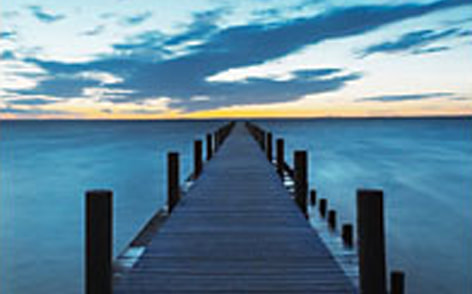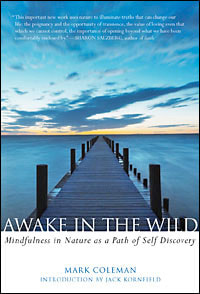|
As those who have read A Wild Faith or have participated in a TorahTrek program know, I believe mindfulness is key to a vibrant, healthy Jewish practice anywhere, and particularly in nature. In Mark Coleman, I have found a kindred soul. Enjoy his keen observations on mindfulness, nature and conscious living. Rabbi Mike Comins Interview: A Conversation with mark coleman
quotes from mark coleman's book, "awake in the wild"
AWAKE IN THE WILD Mindfulness in Nature as a Path of Self-Discovery Mark Coleman (San Francisco: Inner Ocean Publishing, 2006) ...The energy of a place can vary depending on the time of day, the weather, and what animals or humans are inhabiting it in that particular moment. It is also impacted by what you bring to it. For instance, in one moment the energy of a deserted beach can feel open and spacious, and in the next it might feel lonely and somewhat melancholic. An undisturbed woodland may feel enchanted, mysterious, and very peaceful to you on one day and less vital on another. Noticing even subtle differences in our environment and our perceptions is one way to be awake in the wild and in our everyday lives.
Feeling the energy of a place is a kind of sixth sense that can be hard to name or categorize. It involves feeling or intuiting something distinct, even when we can’t describe or prove what it is exactly. Tapping into this sense requires listening to ourselves and trusting our responses to any environment, as well as listening deeply to or sensing the land itself. Be very quiet and let your attention be specific and open. Take your time here, without rushing, going slow enough to see the light moving across an exposed rock, or papery bark peeling off birch trees. How did the silence feel between sounds? Do you feel safe or threatened, as if you were being watched? Do you feel relaxed and at ease or restless and agitated? Does the land speak to you in someway? Turning our awareness to these experiences allows us to come to a deep sense of our internal and external environment. (Page 38) * * * When we spend time in wilderness, it can be tempting to focus our awareness on “doing” something: taking pictures; getting a certain amount of physical exercise; traveling from point A to point B; naming all the species of plants, bugs, animals, or birds we encounter. While nature photography is a lovely craft, and we need to exercise for good health, and understanding what lives and grows in our environment is a valid part of deepening our relationship with the land, these activities can separate us from a more intimate experience of the natural world. It is all too easy to forget to actually experience with all our senses that which we are busily capturing and traveling and identifying. The natural world invites us out of our world of fixed concepts and into a closer proximity with reality—what Buddhist teachings call “non-conceptual awareness.” Experiencing the natural world with non-conceptual awareness means that, rather than seeing a slim black bird and thinking, “that’s a starling, a non-native bird introduced from England several centuries ago,” we stop and see each particular bird’s incandescent blue–black velvet feathers, piercing amber eyes, and delicate wiry feet. Instead of encountering the world through a filter of ideas, memories, and labels, we connect deeply with the unfiltered and final pulse of life in that moment. If we’re not mindful, intellectual knowledge can easily cloud our direct experience. When we’re guided through life solely by our intellect, by our ideas of what we know, we’re robbed of a sense of discovery. Our non-conceptual awareness allows us to approach each moment as fresh and new. A depth of wisdom can arise from such immediacy, and lead to greater wonder about the mysteriousness of life; we may realize just how little we can ever know. (55) * * * Being in nature is not always a pleasant experience. For many people it is distinctly uncomfortable, even scary. It’s easy to understand why: The wilderness is unwieldy and unpredictable. It involves threatening animals and annoying, biting insects. It doesn’t yield up its secrets easily. You can feel too hot in summer, too cold in winter. From one perspective, it is dirty, muddy, messy, chaotic, disorganized. It’s easy to get lost and it’s difficult to get comfortable… There’s another reason why nature is challenging for us: it reminds us that we are ultimately powerless over our environment, that we can’t make it bend to our will. Those feelings of helplessness and powerlessness are so vilified in our culture; they’re categorized as wimpy or weak. It’s no wonder, then, that those who are especially uncomfortable with those kinds of feelings try to tame, master, and pave the wild, and that efforts to live in interconnection with something so much more powerful than ourselves may be taken as a sign of weakness, a kind of character flaw… It is often in adversity that we grow the most, and this is certainly true in the natural world. Nature forces us to learn how to let go when it rains on our picnic or wedding day. It asks us to find a place of ease or peace in the middle of discomfort when we are camping on rocky ground, or shivering through the night on a high altitude expedition. We can develop a deeper sense of fearlessness when we learn how to deal with our anxiety at being alone at night, or when we have encountered predators we have long feared. Whether it’s surviving a horde of mosquitoes in a rain forest, dealing with intense seasickness on heavy ocean swells, or not being able to wash for a week in the desert, we can develop and discover strengths we wouldn’t have known we had, had we not left the safe confines of our houses and hotels. (87-88) * * * Opening our awareness to the natural world can bring us a balanced perspective between life’s agonies and its ecstasies. When we turn our attention to the beauty of the wild, both outside and inside ourselves, even in the midst of city life, the core of our being comes alive with joy and vitality. We can feel connected to life, instead of alienated from the world and society. We can begin to experience nature as a doorway to the sacred, a way to find stillness, silence, and timeless mystery. This is available to anyone, no matter how urban a life you lead. (102) * * * When we are simply attentive to the raw data of sensory experience, we cultivate a quality of bare attention that is free of concepts, that doesn’t make more out of something than it actually is, that doesn’t build a story around the experience or analyze the experience or imagine a different or better scenario. It is a way of being that is free from attachment to our preferences, neither wanting nor avoiding a particular experience. This state is a key to freedom. (114) * * * Nature is a nurturing environment in which we can begin to open up to emotions that have long been repressed. The spaciousness and openness we feel when we look at the ocean or walk in the mountains can give us a larger container to hold any difficult inner experience. While being indoors can sometimes exasperate and intensify feelings, going outside can physically and emotionally give us a breath of fresh air. When we walk with attention to our feet, that bilateral movement assists the brain to process more efficiently. Oscillating our attention between our inner feelings and the outward tranquility of the natural world can prevent us from becoming so overwhelmed by our emotions, and support us in staying balanced even in the midst of great difficulty. (136) * * * Joy is a beautiful quality of the human heart. To feel it brings a much-needed balance to the struggles and pain we can experience. It is an essential quality on the spiritual path, one the Buddha talked of frequently. It is the quality of inner joy that enables spiritual practitioners to endure the ardor of the ascetic life. In my own life, the combination of mindfulness and time in the wilderness has greatly increased my capacity for joy. Awareness practices taught me how to pay attention and how to wake up to the beautiful world around me. Practicing mindfulness outdoors has exposed me to a deep well of abundant happiness. It is this joy that has inspired me to lead others into the wilderness. It is too much to keep all to myself, and it feels natural to share the joy and blessings of nature. (168) Learn more about Mark Coleman at the Awake in the Wild website.
0 Comments
|
Welcome to the TorahTrek eJournal! Here you will find videos, interviews, articles, photos, and educational materials on the interconnections between Judaism, wilderness, spiritual practice and sustainability. Our goal is to support the spiritual/ethical lives of individuals, enliven and strengthen the Jewish community, and promote a sustainable society living in balance with the earth. Explore the eJournal by clicking on the topics below. Please share these resources with your friends! Topics
All
|



 RSS Feed
RSS Feed